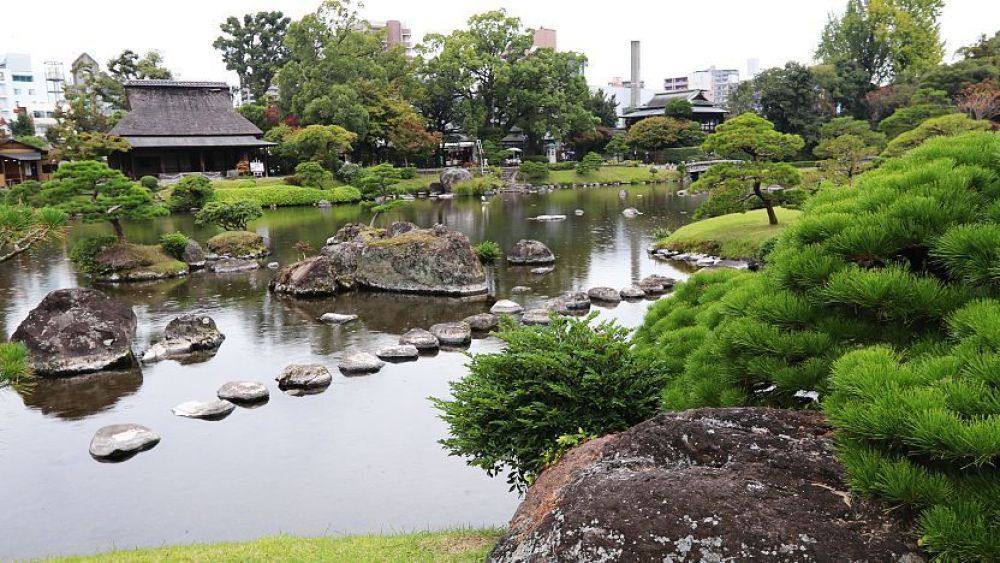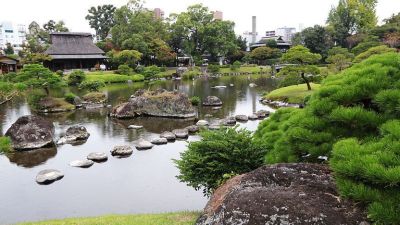

Suizenji Jojuen is a traditional Japanese landscape garden located in Kumamoto, Japan. It is well-known for its scenic beauty, which includes miniature recreations of the 53 post stations of the Tokaido, the road connecting Edo to Kyoto during the Edo Period. Visitors can enjoy a leisurely stroll around the park and take in the meticulously maintained greenery, the large central pond, and the representations of iconic Japanese landmarks, such as Mount Fuji. The garden layout is designed to provide a different experience with each step, featuring various views that are carefully composed to reflect the principles of Japanese aesthetics. Large koi carp can be seen swimming in the ponds, and there are several tea houses where visitors can pause and soak in the ambiance of the garden. The Kyu-Shuizen-ji, a tea room, offers an authentic tea ceremony experience, providing a taste of traditional Japanese culture.
Immerse yourself in a traditional Japanese tea ceremony in the Kokin-Denju-No-Ma tea room within Suizenji Jojuen Garden. The tea room itself is designated as an Important Cultural Property of Japan and provides an authentic setting for this cultural activity. Guests will participate in a centuries-old ritual while learning about the philosophy and customs that underlie the tea ceremony. The experience includes a demonstration of the tea preparation, an explanation of the utensils used and their significance, as well as the consumption of matcha (powdered green tea) and a traditional sweet. This activity is especially popular among those interested in Japanese history and culture, and it provides a serene break from the bustling outside world. Reservations are often required, so planning ahead is recommended.
Suizenji Jojuen Garden is an idyllic spot for a picnic with its expansive central pond and surrounding greenery. Bring a blanket and some local snacks or a bento box and find a comfortable spot along the water's edge. The tranquil environment, paired with views of carefully designed landscapes, creates an ideal atmosphere for a relaxing meal outdoors. Visitors can watch the koi fish, admire the miniature Mount Fuji, and enjoy the changing leaves of the maple trees during autumn or the fresh breeze during spring. Picnicking here allows for a moment of reflection and a chance to appreciate the melding of natural and man-made beauty. Please remember to clear your space after use to help maintain the cleanliness of the park.
For both amateur and professional photographers, as well as artists, Suizenji Jojuen Garden offers a picturesque setting perfect for capturing images or sketching. With its traditional Japanese design, which includes perfectly trimmed shrubs, a serene pond, and beautiful stone bridges, visitors can spend hours finding the best angles and compositions for their shots. Sketchers often bring their materials to sit by the pond or in one of the teahouses, drawing the landscapes or architectural details like the Izumi Shrine. Artists and photographers should be mindful of garden etiquette, including not obstructing pathways and avoiding the use of tripods without permission.
Throughout the year, Suizenji Jojuen Garden transforms with the seasons, showcasing various flowers and plants. Spring visitors can enjoy the cherry blossoms, azaleas, and irises, while summer brings lush greenery and vibrant lotuses. Autumn is particularly famous for its tapestry of red, orange, and yellow leaves that provide a stunning backdrop for a stroll or a photo session. The changing seasons are keenly felt in the garden, and they complement the timeless beauty of the traditional landscape. Seasonal flower viewing is an excellent way for visitors to connect with nature and experience the garden's evolving beauty.
To deepen your understanding of Suizenji Jojuen Garden's history and cultural significance, consider joining a guided historical tour. Knowledgeable guides provide insights into the garden's creation during the Edo period, the symbolism behind its design, and the significance of the various elements such as the bridges, lanterns, and tea houses. The tour includes visits to important sites within the garden, such as the culturally significant Izumi Shrine, which is dedicated to the deity who is believed to have protected the Hosokawa family. Tours may be available in English or Japanese and should be booked in advance to ensure availability.
A family-friendly activity that can be enjoyed by visitors of all ages is feeding the koi carp in the central pond of Suizenji Jojuen Garden. The koi are not only a symbol of luck and prosperity in Japanese culture, but they also add to the overall beauty of the park. Near the pond, there are vending machines dispensing fish food. Guests can purchase small bags of food and enjoy the lively spectacle of koi surfacing to eat right from their hands. It's a simple yet memorable way to interact with nature in the garden and a perfect photo opportunity. Remember to be gentle and to follow any guidelines provided to ensure the well-being of the fish.
Suizenji Jojuen Garden hosts various seasonal festivals and events throughout the year, showcasing Japanese traditions and the garden’s beauty during different seasons. From cherry blossom festivals in the spring to moon-viewing parties in the autumn, these events provide visitors with unique cultural experiences. Activities might include traditional performances, workshops, and special illuminations that highlight the garden's features at night. Attending one of these events is a wonderful way to experience local customs and festivities. Festival dates and times may vary, so it’s recommended to check the garden’s schedule prior to visiting.
Within Suizenji Jojuen Garden, there are a number of traditional rest houses where visitors can take a break from sightseeing. These rest houses, known as oyumiyagura, originally served as watchtowers and now provide a secluded space for relaxation and contemplation. Guests are invited to sit on the tatami mats and enjoy the view of the garden from a different perspective. While some rest houses offer light refreshments and snacks for purchase, others are mainly for resting and admiring the garden’s scenery. These spots are particularly popular during the warmer months as they provide a cool refuge under the thatched roofs.
On special occasions, Suizenji Jojuen Garden offers evening illuminations that bring a magical atmosphere to the traditional landscape. The garden's pathways, trees, and water features are lit up with lanterns and spotlights, creating a fantastical experience as the night falls. These illumination events are a perfect opportunity for visitors to see the garden in a new light, literally. The reflections on the pond and the shadows cast by the trees make for a romantic and enchanting atmosphere. The event dates are often announced in advance and may align with holiday seasons or garden anniversaries.
